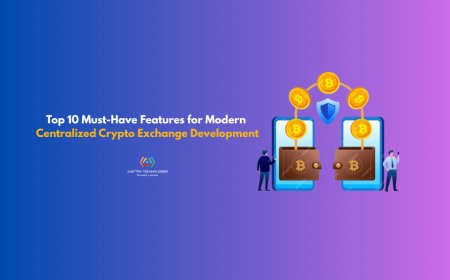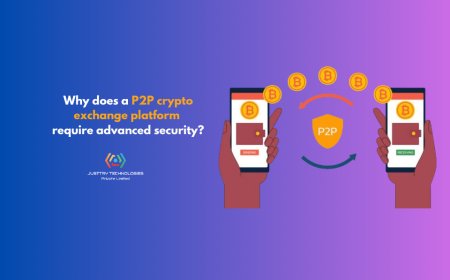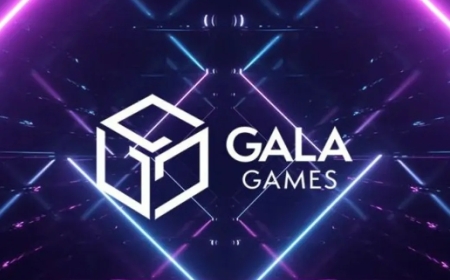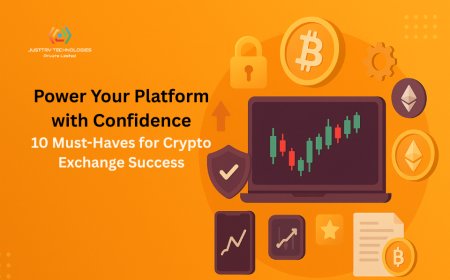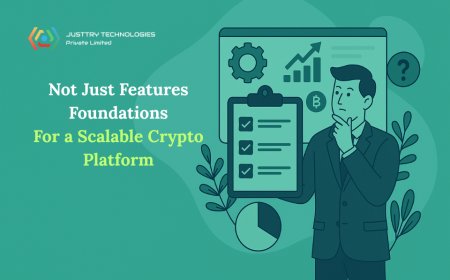Why the Gaming Industry Is Turning to ICOs for Growth and Innovation
This blog explores why the gaming industry is increasingly turning to ICOs for innovation and sustainable growth.

The gaming industry has always been at the forefront of digital innovation. From the early days of arcade machines to today's immersive online multiplayer platforms, the sector has continuously evolved with technology. Now, another major shift is underwaythis time driven by blockchain and cryptocurrency. At the center of this transformation is the Initial Coin Offering (ICO), a fundraising mechanism thats enabling game developers and studios to launch their own crypto tokens to fund development, engage communities, and build expansive in-game economies. This blog explores why the gaming industry is increasingly turning to ICO Development for innovation and sustainable growth.
The Evolution of Game Monetization Models
Before diving into the ICO trend, its important to understand how game monetization has evolved. Traditionally, game developers relied on one-time purchases or subscription models. Over time, this shifted to free-to-play models with in-app purchases, which became particularly dominant in mobile and online gaming.
However, while microtransactions and loot boxes have generated billions in revenue, theyve also sparked criticism. Gamers often complain about pay-to-win mechanics, lack of transparency, and central control over virtual assets. This growing dissatisfaction has paved the way for blockchain-based alternatives that promise true ownership, decentralized economies, and new ways to engage players. ICOs are at the heart of this paradigm shift.
Understanding ICOs in the Gaming Ecosystem
An Initial Coin Offering (ICO) is a fundraising method in which a company issues its own cryptocurrency tokens to investors in exchange for capitalusually in the form of Bitcoin, Ethereum, or stablecoins. These tokens can serve a variety of functions, from acting as in-game currency to providing governance rights or access to exclusive content.
In the context of gaming, ICOs are being used to raise early-stage funding for game development, create vibrant player-driven economies, and align the interests of developers, investors, and gamers through tokenized ecosystems. Unlike traditional venture capital, which often comes with stringent controls and long timelines, ICOs offer developers quicker access to global funding with fewer barriers.
Fueling Innovation and Creativity in Game Development
One of the most compelling reasons game developers are embracing ICOs is the creative freedom they provide. Traditional publishers and investors often impose strict guidelines on game design and monetization strategies. In contrast, ICOs allow developers to pitch their vision directly to the community and secure funding without intermediaries.
This has opened the door to more experimental and genre-defying titles. Developers are no longer bound by whats safe or mainstream. Instead, they can build for niche audiences, explore new mechanics, and implement blockchain features like play-to-earn (P2E) rewards, non-fungible tokens (NFTs), and tokenized governance. As a result, the gaming landscape is becoming more diverse, dynamic, and player-centric.
Enabling True Digital Ownership and Open Economies
Perhaps the most revolutionary impact of ICOs in gaming is their role in enabling true digital ownership. In traditional games, all in-game assetsskins, weapons, characters, and currenciesare owned and controlled by the developer. Even if players spend hundreds of hours or dollars acquiring items, they dont actually own them.
ICOs flip this model on its head. By tokenizing in-game assets and currencies, developers empower players to truly own, trade, and monetize their virtual possessions. These assets live on-chain, meaning they can be transferred, sold, or used across different platforms. This unlocks open economies where value flows freely between players and developers, and where secondary markets thrive without centralized interference.
Building Community-Led Game Ecosystems
ICOs also transform how gaming communities are formed and governed. In traditional models, players have little to no say in how a game evolves. But with blockchain-based games funded via ICOs, players can become stakeholders in the project. By holding governance tokens, they can vote on major decisions such as updates, new features, tokenomics changes, and more.
This creates a more participatory and democratic ecosystem, where the games direction is shaped by those who are most invested in it. The result is stronger community loyalty, higher player engagement, and better alignment between user needs and developer goals.
The Play-to-Earn (P2E) Revolution
One of the most hyped trends in blockchain gaming is play-to-earn, a model in which players earn real-world value by participating in games. ICOs are foundational to this concept because they provide the native tokens that fuel P2E economies.
In a typical P2E setup, players earn tokens for completing quests, winning battles, or contributing to the ecosystem. These tokens can then be traded for fiat, used to buy in-game assets, or reinvested into the game. By launching these tokens through an ICO, developers can jumpstart liquidity, attract players early, and build momentum around their game economy.
Play-to-earn has already created massive success stories likeAxie Infinity, and more developers are entering the space with the hopes of replicating or innovating upon that model. ICOs make it financially and technically feasible to launch these economies from day one.
Global Reach and Community Funding
ICOs also offer gaming projects something traditional fundraising rarely does: a truly global reach. Developers can raise capital from supporters across continents, without the need for a centralized platform or local investors. This opens up opportunities for independent developers in emerging markets to bring their visions to life without being dependent on Silicon Valley or big publishers.
Moreover, gamers themselves can become early supporters and token holders, aligning their interests with the success of the game. This grassroots funding model builds a strong foundation of users who are not just players but also evangelists and investors.
Accelerated Go-to-Market Timelines
ICOs dramatically reduce the time it takes for a game project to go from concept to playable reality. Traditional game development cycles often take years, with funding trickling in through multiple rounds of investment. ICOs, on the other hand, can raise millions within days or weeks, giving teams immediate access to resources.
This speed enables more agile development, faster iterations, and the ability to respond to community feedback in near real-time. The result is not just faster product delivery, but also games that are better aligned with user expectations.
Risk Mitigation Through Decentralization
Another advantage of ICOs is risk diversification. In the traditional model, a single studio or publisher holds all the development and financial risk. If the game fails, the losses are centralized. In the ICO model, the risk is distributed across thousands of token holders who voluntarily opt into the ecosystem.
This decentralization not only mitigates risk but also fosters a stronger sense of shared responsibility. When players, investors, and developers all have skin in the game, theyre more likely to contribute positively to the ecosystems successwhether that means providing feedback, evangelizing the game, or creating third-party tools and content.
Regulatory Awareness and Legal Compliance
Despite the benefits, it's important to note that ICOs exist in a rapidly evolving regulatory landscape. In some jurisdictions, they may be considered securities offerings and require compliance with local laws. Game developers turning to ICOs must ensure that their token models are legally sound, with clearly defined utility, transparent tokenomics, and robust smart contracts.
Many gaming companies are now working with legal advisors and blockchain development partners to structure their ICOs in a compliant and future-proof manner. Some are even opting for alternative models like IEOs (Initial Exchange Offerings) or IDOs (Initial DEX Offerings) that offer more regulatory clarity and built-in compliance tools.
Real-World Case Studies: Games Powered by ICOs
Several successful games have already demonstrated the power of ICO-based funding.Decentralandlaunched its MANA token through an ICO, raising over $20 million to build a fully decentralized virtual world.The Sandboxconducted multiple token sales to fund its voxel-based metaverse, now hosting partnerships with brands like Atari and Snoop Dogg.Illuviumraised capital via its ILV token to create a high-fidelity blockchain RPG with play-to-earn mechanics.
These examples show that ICOs are not just speculative toolsthey are viable, scalable funding models that support complex and community-driven game development.
The Road Ahead: Challenges and Opportunities
While the benefits of ICOs are compelling, there are still challenges to navigate. Token design must be sustainable, avoiding hyperinflation or pump-and-dump schemes. Developers must balance decentralization with coherent game design and narrative control. Security remains a major concern, as poorly written smart contracts can lead to exploits and token loss.
That said, the opportunities far outweigh the risks for teams that approach ICOs strategically. With the right technology partner, community engagement strategy, and legal compliance framework, gaming companies can unlock a powerful new era of decentralized, player-owned experiences.
Conclusion:
The convergence of gaming and blockchain is no longer a speculative trendits a rapidly unfolding reality. ICOs are playing a pivotal role in this transformation by offering developers a way to fund projects, empower players, and build robust virtual economies without relying on traditional gatekeepers.
As more gamers demand transparency, ownership, and earning potential, ICOs offer a compelling solution that aligns with both creative freedom and financial innovation. For developers ready to embrace this shift, ICOs are not just a funding mechanismtheyre a blueprint for the next generation of games





